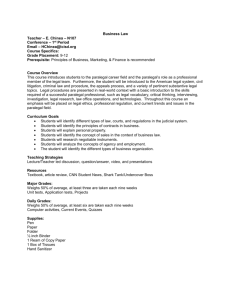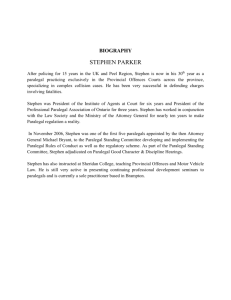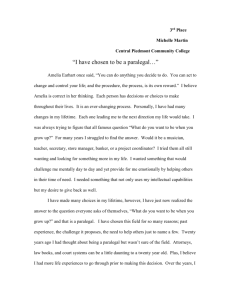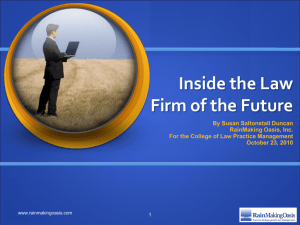Wilson April Wilson Kade Parry English 1010 – Section 058 07
advertisement
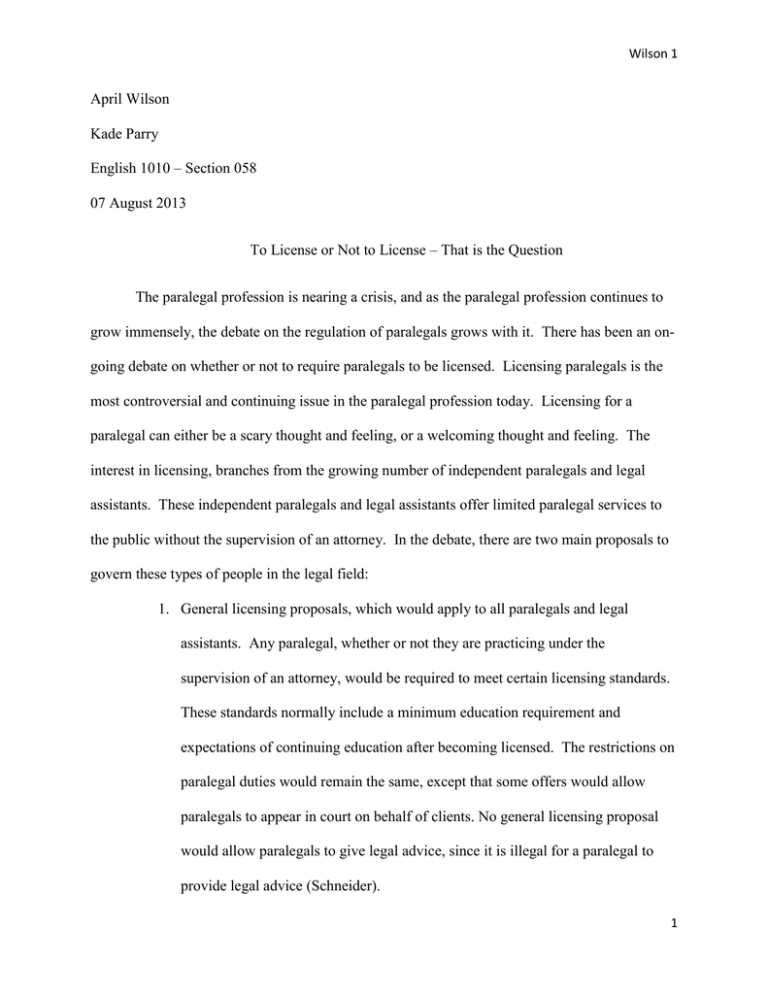
Wilson 1 April Wilson Kade Parry English 1010 – Section 058 07 August 2013 To License or Not to License – That is the Question The paralegal profession is nearing a crisis, and as the paralegal profession continues to grow immensely, the debate on the regulation of paralegals grows with it. There has been an ongoing debate on whether or not to require paralegals to be licensed. Licensing paralegals is the most controversial and continuing issue in the paralegal profession today. Licensing for a paralegal can either be a scary thought and feeling, or a welcoming thought and feeling. The interest in licensing, branches from the growing number of independent paralegals and legal assistants. These independent paralegals and legal assistants offer limited paralegal services to the public without the supervision of an attorney. In the debate, there are two main proposals to govern these types of people in the legal field: 1. General licensing proposals, which would apply to all paralegals and legal assistants. Any paralegal, whether or not they are practicing under the supervision of an attorney, would be required to meet certain licensing standards. These standards normally include a minimum education requirement and expectations of continuing education after becoming licensed. The restrictions on paralegal duties would remain the same, except that some offers would allow paralegals to appear in court on behalf of clients. No general licensing proposal would allow paralegals to give legal advice, since it is illegal for a paralegal to provide legal advice (Schneider). 1 Wilson 2 2. Limited paralegal licensing proposals are directed toward those paralegals who practice without the supervision of an attorney. These proposals allow the freelance or legal technician paralegal to provide paralegals services on routine legal matters. Legal technicians could handle simple divorces, will executions, real estate transactions, and bankruptcy filings without the supervision of a lawyer, and they would also be allowed to give legal advice to clients on these limited matters (Schneider). The demand for good quality, low-cost legal services continues to rise. The licensing of a paralegal would assist clients by improving low-cost, high-quality legal services. It's resourceful. It's practical. The uses of well-trained and highly skilled paralegals that are supervised by attorneys are one resource to utilize to meet the growing rise. Some would argue that states should implement licensing, which would require paralegals to take practical proficiency tests, to pass character evaluations, and to meet such minimum educational requirements as a bachelor's degree from an accredited institution. There are, however, many professionals in the field that would disagree. Regardless of some extra governmental expense, licensing is the only way to guarantee that the work of paralegals meets the professional standards of the legal profession. There are many different viewpoints on whether or not to require paralegals to be licensed. There are legislators and paralegals are for the licensure of paralegals and that requiring licensure would guarantee that clients receive services from qualified and trained professionals, and it would help differentiate paralegals from legal secretaries. But, there are legislators and paralegals that debate that licensure is needless because unauthorized practice of 2 Wilson 3 law statutes provide adequate safety measures and already outline what a paralegal can and cannot do (Vuong). What would this mean for current and future students who want to go into the paralegal profession? Those in the legal profession who teach in universities and colleges, regularly speak out concerning this topic. The licensure of paralegals will bring about new educational standards and new requirements that many in the profession, may not have. Many of the paralegals will likely fall within the restrictions of whatever “grandfathering” standards that would be established, but students who are currently going to school for paralegal studies are worried about this, because it could impose more requirements to obtain a degree, which means more money spent for that degree. Some students are all for the licensure and obtaining the necessary education, and there are other students who do not want to do more than what is currently required. What about from the view of people who are currently paralegals? Karen George, who is a paralegal, is all for the licensing of paralegals. George did an interview with a forum called The Paralegal Society, and in the article she gave her stance on this controversial issue. “The title “Paralegal” is no longer exclusively used as a title given to an “exceptional” legal assistant in the form of a promotion, so that a firm will not lose him or her as an employee. “We, as paralegals and as professionals, should expect and demand more for our profession (George).” George also goes on to state, “Too many “colleges” and “universities” are popping up around the countries that offer no real value for our profession.” They charge exorbitant fees to unsuspecting pupils and turn out graduates who cannot get a job. In large part, this is because paralegal students are not being taught the essentials which are fundamentally necessary in order to do the job. These “victims” are saddled with school loans, no job and the daunting 3 Wilson 4 potential for financial ruin. This would end with licensure because standards would be set and educational institutions would have to abide by them” (George). The American Bar Association, also commonly known as the ABA, is against the mandatory licensing of paralegals, and it states “that the obligation of attorney supervision is sufficient protection for the public.” The ABA has confidence in that permitting paralegals to be licensed will create confusion because some members of the public, whom might believe that a licensed paralegal can offer legal advice, which is incorrect, because paralegals cannot give legal advice. In addition, some attorneys foresee an increase in the cost of legal services, because lawyers will be forced to hire paralegals with more education who demand higher salaries since they will be licensed. The National Federation of Paralegal Associations, also known as NFPA, supports the mandatory licensing of paralegals. The NFPA also has an established procedure for certifying paralegal competence, but it regards this as a supplement to mandatory licensing. The NFPA believes that licensing will increase the access of people with little to no money to legal services, by allowing paralegals to handle routine matters without the supervision of an attorney. The NFPA also believes that the current absence of licensing allows many unqualified persons to practice as paralegals. The NFPA perceives licensing as a means of raising the standards of the profession, while removing unqualified paralegals and legal assistants (Schneider). The National Association of Legal Assistants, also known as NALA, is against the licensure of paralegals. This is. NALA is an association that has established procedures for certifying paralegals. Certifying, however, is different than licensing. On NALA’s website, the President of NALA, Vicki Voisin, states, “The profession continues to debate the issue of licensure, often to the detriment of the growth of the career field. Within these debates, the issues 4 Wilson 5 of the perceived need for professional recognition are confused with the purposes of governmental regulation. This confusion of issues has led us into non-productive, time wasting debates. Let us be smart about our direction and the growth of our profession - let us choose a path for the career field that is definable and achievable, controlled by our profession with its growth as the driving force” (Voisin). In conclusion, the licensure of paralegals will eventually happen. I personally believe that it must, and it should. The question for many students, paralegals and professionals already working in the field is: will it be today, tomorrow or sometime in the not too distant future? The American Bar Association (ABA) already acknowledges paralegals as working professionals. Yet, paralegals currently in the field, are working within a profession that has little governance or set direction. Many paralegals in the profession try to implement their own rules and regulations through codes such as ethics and by-laws, but there are no actual laws for a paralegal. I personally would prefer it to happen sooner than later, so that I can have the capability to speak out and contribute to what will eventually mean for my future and the paralegal profession. Happening sooner than later will also help me with being able to obtain the proper education, take exams, and prepare to meet the professional standards of the legal profession. “A legal assistant or paralegal is a person, qualified by education, training or work experience who is employed or retained by a lawyer, law office, corporation, governmental agency or other entity and who performs specifically delegated substantive legal work for which a lawyer is responsible” (American Bar Association). 5 Wilson 6 Works Cited 1. "Competition From The Unlicensed." ABA Journal 79.12 (1993): 56. Academic Search Premier. Web. 20 July 2013. 2. Furi-Perry, Ursula. "Paralegal Licensing and Regulation: Part I-The ''Pros''" Paralegal Licensing and Regulation: Part I-The ''Pros'' Law Crossing, 16 June 2011. Web. 21 July 2013. 3. Furi-Perry, Ursula. "Paralegal Licensing and Regulation: Part II-The ''Cons''" Paralegal Licensing and Regulation: Part II-The ''Cons'' Law Crossing, 16 June 2011. Web. 21 July 2013. 4. George, Karen. "To License or Not to License?" Interview. Web log post. The Paralegal Society. The Paralegal Society, 10 Aug. 2011. Web. 19 July 2013. 5. McCormack, Shannon. "Pros & Cons of Paralegal Licensing | EHow." EHow. Demand Media, 17 Nov. 2009. Web. 21 July 2013. 6. Samborn, Hope Viner, and Theresa Meehan Rudy. "Legal Assistants: Has The Time Arrived For State-By-State Licensing?." ABA Journal 78.12 (1992): 42, 43. Academic Search Premier. Web. 20 July 2013. 7. Schneider, Steve W. "Being a Paralegal." The Licensing Debate -. Netplaces - Being a Paralegal, 15 Apr. 2007. Web. 19 July 2013. 8. Voison, Vicki. "Issues Related to Licensure." Issues Related to Licensure. The National Association of Legal Assistants, 14 Dec. 1998. Web. 20 July 2013. 9. Vuong, Patrick. "Paralegal Regulation in the United States." Paralegal Regulation in the United States. Paralegal Today, 11 Mar. 2006. Web. 19 July 2013. 6

